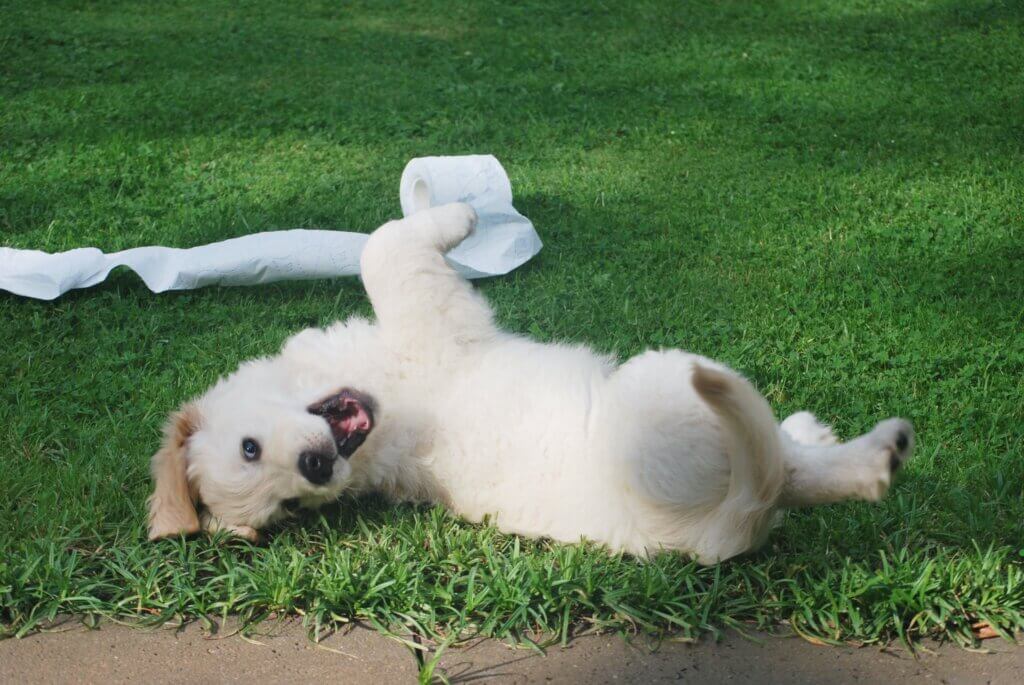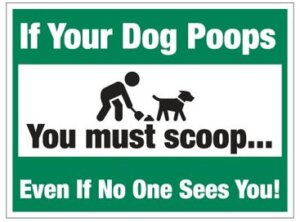What Really Happens to Left Behind Dog Poop

Scooping poop is a chore, which may be why there always seems to be left behind dog poop.
Did you 40% of Americans don’t pick up after their dogs? Considering the millions of dogs that live in America, that equates to a lot of left behind dog poop.
And left behind dog poop is harmful.
The Associated Veterinary Medical Center reports, “The Environmental Protection Agency classifies dog poop as a pollutant, in the same category as oil spills, herbicides, insecticides, and salt from irrigation practices, because of the nutrients and pathogens that leach into soil and water, and impact wildlife, plant growth, and human health.”
The problem is that left behind dog poop does quite a bit of harm – to our yards, our water systems, and our environment.
It Does Not Fertilize the Yard
One of the common misconceptions about left behind dog poop is that it acts as a fertilizer.
This is easy to understand, as other types of poop or manure are used as fertilizers.
According to Lawn Love, “Dogs eat a lot of meat, while cows eat plant matter exclusively. […] Protein from meat is what makes dog poop too nitrogen-rich for your lawn. Since cows don’t eat meat, cow manure doesn’t have the same problem. In fact, cow manure makes good fertilizer because it is low in nitrogen and high in nutrients.”
So rather than fertilizing your yard, left behind dog poop actually harms your yard. In time, it kills grass and causes lawn fungus.
Toxic Bacteria Enters the Soil
The longer dog poop sits in the yard, the more opportunities it has to contaminate your yard.
Dr. Emily Beeler explains, “Animal owners may mistakenly believe that only fresh, odiferous feces present a health risk. In fact, many parasite eggs found in feces do not reach the infectious stage until days or weeks after the animal defecated. Allowing feces to dry out and disintegrate contaminates the soil and creates an elevated risk for exposure to parasites. Most parasite eggs can remain viable in soil for months or years.”
Once the bacteria have entered the soil, it stays there…until it is picked up by children’s hands or carried indoors on the bottoms of your shoes.
[Related Read: All the Different Diseases in Dog Poop]
Makes Its Way into Water Systems
In addition to entering our soil, the bacteria from left behind dog poop makes their way into our water systems.
The EPA explains, “Pet waste left on sidewalks, streets, yards or other open areas can be washed away and carried by rainwater into storm drains to nearby rivers, lakes, and streams and cause many problems. […] Pet waste contributes to bacterial contamination of our rivers, lakes, and streams. Pet waste contains harmful bacteria such as E. Coli and fecal coliform. Waters that contain a high amount of bacteria such as E. Coli are unfit for human contact.”
Draws Bugs and Rodents to the Yard
When dog poop is allowed to pile up in your yard, bugs and rodents find their way to your yard.
Rodents are especially attracted to pet waste.
In addition to having to worry about the diseases found in dog poop, you will also have to worry about bugs and rodents spreading these diseases.
Stinks Up Your Yard
Have you ever walked past someone’s house who hasn’t picked up piles of dog poop?
The poop smell lingers. It doesn’t fade away naturally.
The more poop remains in the yard, the worse it will smell.
Leads to Fines
There are actually laws regarding left behind dog poop.
In major cities across the U.S., you can receive a fine for not cleaning up or scooping your dog’s poop.
The fines range from $100 to $2000.
For example, here is an Austin, Texas city ordinance:
- 3-4-6 DEFECATION BY A DOG OR CAT. “An owner or handler shall promptly remove and sanitarily dispose of feces left on public or private property by a dog or cat being handled by the person, other than property owned by the owner or handler of the dog or cat.” Potential fine: Up to $500.
Do Away with Doody with Super Scoopers
There are many different reasons why people don’t scoop the poop regularly.
Whether you are too busy or physically struggle to scoop the poop, Super Scoopers is here to help.
Depending on how many dogs you have, the size of your yard, and the number of times your dogs go number two daily, Super Scoopers can come to scoop the poop once a week, twice a week, or bi-weekly.



